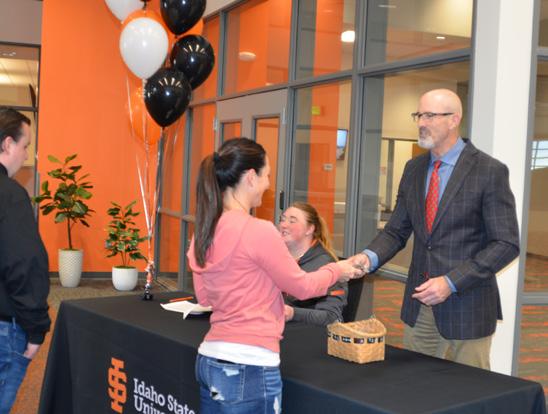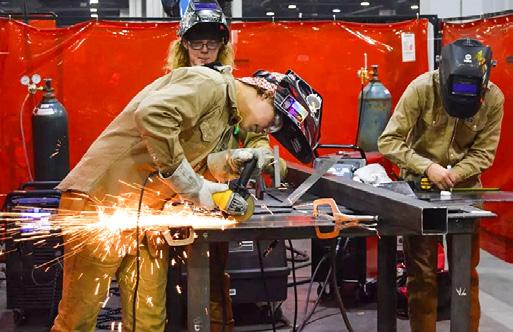
6 minute read
Leading Idaho Grant
Leading Idaho Grant Provides Vital Learning Equipment to ISU Students
During hands-on education, it is vital that students have access to the latest, groundbreaking equipment to ensure what they learn in the classroom applies directly to their careers. Thanks to a recent $1.6 million grant, the Idaho State University College of Technology will continue to do just that. The Leading Idaho Grant is part of Governor Brad Little’s plan to expand and modernize career technical education (CTE) in Idaho. To be eligible for the funding, the CTE program must support Idaho’s fastest-growing, highest-demand occupations. This award will go toward the purchase of cutting-edge equipment and program improvements that will prepare students to work with the latest technology in their fields. “At Idaho State University, we are focused on both preparing students to succeed in their chosen fields and to provide a high-quality workforce for Idaho business and industry,” said Idaho State University President Kevin Satterlee. “This grant expands our educational offerings and ensures that our graduates are ready for their future.” The funds from the Leading Idaho Grant will be put to use immediately to benefit currently enrolled students as well as future students. Twelve ISU College of Technology programs will benefit directly from this award — including Practical Nursing, Nuclear Operations, Aircraft Maintenance, Industrial Cybersecurity and more. This article highlights some of the equipment that will help ensure the next generation of workers are prepared to meet today’s workforce needs.
Automotive Technology: Electric Vehicle Switch Lab The Switch Lab is a fully-operational electric vehicle which is designed for students to completely disassemble and rebuild. This gives the students the opportunity to learn on electric vehicles in a safe, standardized way. The kit is all-inclusive, road ready and contains the chassis, drive system, batteries, wiring, lights, seat, seatbelt and windscreen.
Automotive Collision Repair & Refinishing: Virtual Reality Painting Simulator The Sim Spray virtual reality painting system not only prevents students from potentially making a mistake on a real vehicle, but it also saves up to 50% of the cost of paint. On top of this, it has been shown to teach students more quickly. Students in the program will still learn to paint on real cars but only after they have shown adequate proficiency in the simulator.
Health Occupations: Laerdal SimMan 3G Plus Manikin SimMan 3G Plus is a high fidelity, easy to operate human simulation mannequin designed for a fully-immersive simulation experience and will help students respond to scenarios they may not come across in clinical settings. This SimMan is so realistic it blinks, sheds tears, sweats, breaths and allows students to use real clinical devices such as blood pressure cuffs. Instructors are able to operate the SimMan in separate control rooms and can spontaneously respond to the treatment from the students. College of Technology nursing programs also received a Laerdal SimJunior (which simulates a 6-year-old child) and a SimBaby (which simulates an infant 9 months of age). All health occupations programs at the College of Technology will benefit from the use of these human simulation mannequins.
Nuclear Operations: Personnel Contamination Monitor Training System This simulated contamination monitor recreates a variety of events in a safe environment and allows students to practice radiologically-controlled area exit processes. This simulator completes the Radiological Mock-Up Lab in the Eames Complex. The instructors are able to remotely signal the device to act in certain ways — requiring students to respond in real-time to mimic actual working conditions.









Welding: Arclight Dynamics CNC Plasma Table The sleek design of this four-feet by eight-feet plasma CNC table will allow students to apply metal cutting processes used in manufacturing, agricultural, engineering and construction industries. This table has been recommended by the Welding Technical Advisory Committee and will be an enriching addition for students.
Unmanned Aerial Systems: DJI Enterprise Zenmuse L1 LiDAR This piece of equipment is a drone-based survey camera and LiDAR system that allows the user to 3D map and digitize just about anything. The machine boasts up to a 450-meter detection range and can even break down the environment into separate parts which allows it to do things like count the number of trees in a scan and measure the distance between points. The scans are accurate down to the centimeter level and all of this data is available in real-time.
Computerized Machining: Verisurf Peel 2 3D Scanner This scanner is an accurate handheld scanner that provides fast and easy data collection. It works at an astounding speed with a scan rate of up to 550,000 measurements per second. It does all of this with an accuracy of up to 0.250 mm or about one one-hundredth of an inch. The Peel 2 can be used for many applications such as reverse engineering, inspection and more. Students will be able to scan an object and convert a file to Mastercam so it can be manufactured on a CNC.
Aircraft Maintenance: AE-30-4F1 Engine Test Stand and Helicopter Rebuild Kit The Aircraft Maintenance Program is receiving an AE30-4F1 engine test stand (pictured top right). It contains an operational four-cylinder reciprocating engine that sits within a semi-enclosed space and can be used for numerous tests and lessons including dismantling it and the subsequent reassembly. The program also received a rebuild kit for a Robinson R-22 helicopter that will provide students with various troubleshooting and repair scenarios.
Civil Engineering Technology: Instrotek CoreLok Gravity Unit “As part of an effort to create a new state-of-the-art materials testing laboratory for the Civil Engineering Technology (CET) Program in the College of Technology, we are in the process of procuring some of the latest and greatest laboratory equipment made available to industry,” said John Liimakka, a clinical instructor in the CET Program. CoreLok by Instrotek is an innovative asphalt density measurement system. It is widely considered to be the most versatile instrument of its kind available to the industry. It is primarily used to test construction materials associated with asphalt road projects. It tests the maximum, aggregate and bulk specific gravities as well as the porosity of the material and the percent asphalt content. It does this by using a method called water displacement that requires the removal of all air. This was previously a long and tedious process that will be significantly reduced thanks to the puncture resistant vacuum seal bags used in the CoreLok and the overall ease of use it provides.
Diesel/On-Site Power Generation Technology: Tier 4 Diesel Emission Trainer Additionally, a generous donation made by longtime ISU benefactor Bill Eames supplemented Leading Idaho Grant funds to purchase a Tier 4 Diesel Emissions Trainer which will give students experience with the latest sustainability technology capable of reducing emissions by 90%.

“Our goal is to provide students with the skills and knowledge to be successful in tomorrow’s industries,” says Debbie Ronneburg, interim dean for the ISU College of Technology. “The Leading Idaho Grant will have a significant impact on student learning and will familiarize students with emerging technologies. Students will gain confidence knowing that they will be well-prepared as they enter the workforce.” This is the second year in a row that ISU has received this grant. Last year, the College of Technology received $1 million to purchase a five-axis computerized milling machine, a NuScale small modular reactor simulator, two Anatomage virtual anatomy tables and a K-TIG Orbital Welder for manufacturing and unique applications for nuclear-grade fabrication.













